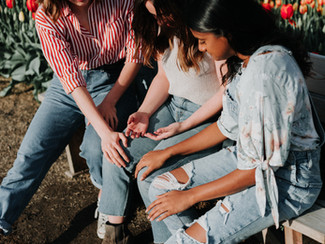The Gift of Self-Forgiveness
- Sam Franklin
- Apr 15, 2024
- 6 min read
Forgiving others can be difficult, but I’ve found personally and through working with others that forgiving ourselves can be even more challenging at times. I’ve often thought of this topic as a blog post, but have avoided it for many months. I’m still learning to forgive myself for some of the hardest times in my life and wasn't sure how to write about a topic I’ve struggled with for so many years. I’m someone who can be hard on myself and sometimes my worst critic. I’ve done a lot of work on developing compassion for myself, but it’s definitely been a turbulent journey.

The hardest part of my self-forgiveness journey is the story of my alcohol abuse. I’m currently sober and have been for years at this point. But the guilt and shame that I was left with during my recovery has been the hardest part of it. People in my life had long since forgiven me before I was able to begin to forgive myself. In fact, the laundry list of harms I had beaten myself up over were much longer than anyone else’s.
I’ve been able to see this challenge of forgiving myself as explained by the fact that I am a good person who would not intentionally want to hurt others. I want to love and uplift those around me, especially the ones closest to me. So of course it hurts me to know I’ve hurt others. The guilt and shame have been signals - clues that I did not live up to my values and my best self. The point of these emotions have been to encourage me to make amends and repair those I hurt, stop harmful behavior, and align my actions with my values.
In all that focus on hurting others, I missed out on the fact that I was hurting myself by continuing to hold back the forgiveness I owed to myself. The truth is that I owed myself compassion and understanding for why I turned to alcohol to deal with everything happening in my life. I had to first understand what the behavior of drinking was trying to help me with at the time - why I did what I did. It was important to understand the pain I was trying to cover up with alcohol, where that pain originated, and what it was about.
I needed to explore the ways in which I did not learn alternative and healthier ways of handling stress, emotions, and other challenges. I also needed to care for that younger part of myself that did not feel cared for. I realized by continuing to be critical of myself for my actions back then I was still not caring for myself. I needed love, not judgment.
Here’s the part in the process where people I work with, during their own healing and recovery journeys, have a hard time with. They often feel that if they give themselves compassion, love, understanding, and forgiveness then it’s as if they are excusing what they’ve done. Sometimes people even believe that they don’t “deserve” to be forgiven because of all the shame they carry about themselves. Here is where I often ask questions like these (half serious, half playfully): “How long is your sentence for what you’ve done?” “What is a fair length of time to punish someone for what you’ve done?” “Does the punishment fit the crime?”
The point of these questions is to make the person think about the reality that they are punishing themselves. It’s not uncommon for people to unconsciously plan to punish themselves for the rest of their lives, which often is way too long of a sentence and doesn’t always serve any type of justice or true amends.

I once did a past life regression where in that life I had lost my wife and child. I blamed myself for both of these deaths. I had decided to live the rest of my life alone because I didn’t feel that I deserved love. Much later during that lifetime, shortly before my passing, I found love again. When I transitioned back into the spirit world after I died I looked back at my life and realized just how much time I had wasted being angry and bitter, blaming and punishing myself, and isolating myself from the world. I realized I had helped no one or made anything better. I had not solved or fixed anything related to the losses in my life. My pain and suffering didn’t do anything to change what had happened. It felt like it was all for nothing. I even met with my wife and child in the spirit world after I transitioned and heard how they had forgiven me. It was only me who hadn’t forgiven myself.
That was a powerful session that helped me understand on a deeper level that forgiving ourselves is just as important as forgiving others. Self-forgiveness is a gift we deserve to give ourselves.
So with this new understanding, I began my own work on self-forgiveness. I provided myself with the love I so desperately wanted back then but wasn’t receiving. I learned to be the parent to my younger self where gaps existed between what I needed and what my parents were able to provide at the time. I became what I needed, and through that I started to whittle away at the guilt and shame. I saw I was human. I made mistakes. I hurt others out of my own hurt and pain. I saw I had changed and was not that person anymore, but I was holding myself back in the past by not allowing myself to move forward and forgive myself.
It is possible to hold yourself accountable and give yourself grace, compassion, and forgiveness. These are not mutually exclusive. I’ve often discovered that as we provide compassion for ourselves, we lessen the shame, and it becomes easier to face what we’ve done and hold ourselves accountable. We can face our past from a more open and regulated space when we’ve met ourselves with love and understanding first. It can be hard to reverse these orders and start with love first before taking ourselves to trial, but it’s necessary.

Here is an imagery exercise that you can use to try and move towards more self-compassion and self-forgiveness:
Think of an age during your past (often childhood is a good place to start) where you can find compassion or feel a softness towards yourself. It might show up as sadness or empathy too. If it helps, find a picture of yourself from that time period. If this is difficult for you, think of a child or person who you more easily have compassion for.
Imagine that younger version of yourself or that other person in your mind. Notice what emotions and thoughts arise, and how you feel towards them. Notice any urges you have, such as wanting to sit beside them, embrace them, reassure them, cry, etc.
Imagine that younger version of yourself or that other person has made a mistake or hurt someone, and visualize that they are upset. Notice what they do when they are upset and what happens inside your body when you witness this. Again, notice any emotions, thoughts, body sensations, and action urges.
Imagine taking those desired actions and providing that love and compassion to that child or person. Notice what happens in your body as you do this, and notice what happens for that younger self or other person.
Take some time after this exercise to process anything that came up. Journaling can be helpful. Most importantly take some time to take care of yourself afterward.
I recommend doing this imagery exercise more than once if needed. If this is the first time meeting your younger self, you may need to allow for a lot more space for their emotions and what they have to say. Patience may be needed as they learn to reconnect with who you are now.
This is called inner child work and can be difficult to do on your own, especially in the beginning. It is something I offer in my sessions and enjoy walking people through. If you’d like to explore inner child work, work on developing more self-compassion, or work through self-forgiveness, reach out to me. I’d be honored to walk beside you on this journey.







Comments